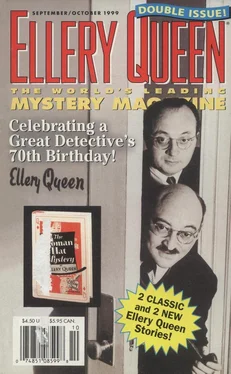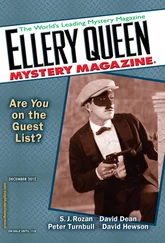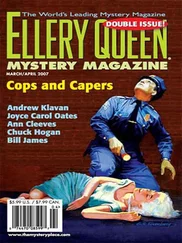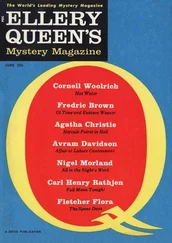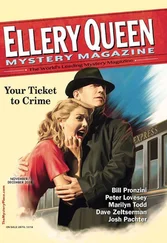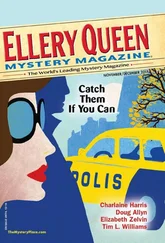Jon Breen - Ellery Queen’s Mystery Magazine. Vol. 114, No. 3 & 4. Whole No. 697 & 698, September/October 1999
Здесь есть возможность читать онлайн «Jon Breen - Ellery Queen’s Mystery Magazine. Vol. 114, No. 3 & 4. Whole No. 697 & 698, September/October 1999» весь текст электронной книги совершенно бесплатно (целиком полную версию без сокращений). В некоторых случаях можно слушать аудио, скачать через торрент в формате fb2 и присутствует краткое содержание. Город: New York, Год выпуска: 1999, Издательство: Davis Publications, Жанр: Детектив, на английском языке. Описание произведения, (предисловие) а так же отзывы посетителей доступны на портале библиотеки ЛибКат.
- Название:Ellery Queen’s Mystery Magazine. Vol. 114, No. 3 & 4. Whole No. 697 & 698, September/October 1999
- Автор:
- Издательство:Davis Publications
- Жанр:
- Год:1999
- Город:New York
- ISBN:нет данных
- Рейтинг книги:4 / 5. Голосов: 1
-
Избранное:Добавить в избранное
- Отзывы:
-
Ваша оценка:
- 80
- 1
- 2
- 3
- 4
- 5
Ellery Queen’s Mystery Magazine. Vol. 114, No. 3 & 4. Whole No. 697 & 698, September/October 1999: краткое содержание, описание и аннотация
Предлагаем к чтению аннотацию, описание, краткое содержание или предисловие (зависит от того, что написал сам автор книги «Ellery Queen’s Mystery Magazine. Vol. 114, No. 3 & 4. Whole No. 697 & 698, September/October 1999»). Если вы не нашли необходимую информацию о книге — напишите в комментариях, мы постараемся отыскать её.
Ellery Queen’s Mystery Magazine. Vol. 114, No. 3 & 4. Whole No. 697 & 698, September/October 1999 — читать онлайн бесплатно полную книгу (весь текст) целиком
Ниже представлен текст книги, разбитый по страницам. Система сохранения места последней прочитанной страницы, позволяет с удобством читать онлайн бесплатно книгу «Ellery Queen’s Mystery Magazine. Vol. 114, No. 3 & 4. Whole No. 697 & 698, September/October 1999», без необходимости каждый раз заново искать на чём Вы остановились. Поставьте закладку, и сможете в любой момент перейти на страницу, на которой закончили чтение.
Интервал:
Закладка:
“Rumpole,” my wife Hilda, known to me only as She Who Must Be Obeyed, trumpeted like the recording angel uttering a hostile verdict on the Day of Judgement. “How can you possibly defend that appalling Poppy woman?”
“Perfectly easy,” I told her. “You put on the crumpled gown, perch the yellowing wig on your head, stand up, and try to make the prosecution witnesses look silly. Call me old-fashioned, but that’s the way it’s always worked for me in the past. And in her case the prosecution have completely failed to produce a corpse.”
“She did away with him, quite obviously. He’s undoubtedly at the bottom of the sea. I can’t think how she got you to defend her. Fluttered her eyelashes at you, I suppose. You’re such a fool, Rumpole. Where women are concerned.”
In fact she was wrong. Poppy’s eyelashes were not of the fluttering variety. She was a big, fair-haired, blue-eyed, you might say “beefy” woman who would have been naturally cheerful if she hadn’t suffered the handicap of marriage to a smaller, crinkly-haired, devious businessman with protruding teeth who looked, in the photographs we had of him, like one of the smaller and less attractive rodents. The Twinehams had a six-year-old daughter named Charlotte, whom her father always called “Charlie,” fondly believing that this child, to whom he gave all the love he denied her mother, was some perfected, far more attractive, and considerably more honest edition of himself.
Occasionally flush with money, often teetering on the verge of bankruptcy, the Twinehams kept a boat in the marina, handy for their cottage in Devon. This “twenty-six footer,” as it came to be known among the landlubbers in the Old Bailey, was christened — inappropriately, if it was indeed the setting for a violent marital murder — Love’s Young Dream. In it Poppy and her husband, unaccompanied by Charlotte, who was staying with a grandmother in Ealing, set sail, one winter morning, to practise for a local regatta. When Loves Young Dream returned to port, Poppy was the sole surviving member of the crew. Charley’s body was never found and was presumed to be drifting away towards America, feeding fishes in unplumbable depths. Subsequent enquiries led to the arrest of Poppy on the charge of murder and landed me, ten days before Christmas, in the Ludgate Circus Palais de Justice, listening to that opera enthusiast and indifferent advocate, Claude Erskine-Brown, as he opened the prosecution against Hilda’s least favourite woman. He presented a case which had every possible evidence of guilt about it except for that one essential — a dead person.
“I am distinctly worried,” Claude confided in me as we sat in the Old Bailey canteen, drinking the black and watery brew which came out of the machine that dispensed indistinguishable tea, coffee, or soup. “I can’t find enough Humpy Camels.” Christmas was coming and that year it wasn’t turtles or action men, Teletubbies or Barbie dolls, but a lugubrious family of ruminant quadrupeds who came inappropriately dressed as pop stars, space travellers, or members of famous football teams. Tristram and Isolde, the operatically named offspring of Claude and his wife Phillida, the Portia of our chambers, were then of an age to appreciate such toys. Sadly, Claude had searched some ten shops in vain; in that hectic week before Christmas, Humpies seemed to be all sold out, and Phillida was far too busy to join in the hunt.
“What can I do, Rumpole?” There was a note of desperation in my opponent’s voice.
“Forget Humpy for the moment,” I advised that stricken fellow. “Seek relief in some less taxing diversion. Such as the Twineham murder case.”
I suppose, in the circumstances, it was not surprising that Claude’s opening speech should have been a little distracted, at times incoherent, but the strength of the case against Poppy emerged strongly. Love had clearly died between her and Charley on the morning they took the boat out. When she returned alone, fellow members of the yacht club remembered shouting matches between the couple in which an irate Poppy had often wished her husband dead and had told him that she’d kill him if he got into another financial or amorous scrape, because Charley’s ratlike appearance didn’t stop him pursuing, and sometimes even catching, other women. She discussed, with various “friends,” cases in which wives who had done in their husbands escaped because of extreme provocation. Further police searches revealed Poppy’s diaries, to which she had confided her frequent temptations to enter a happy state of premature widowhood. Charley had left a sample of blood during the checkup at the doctor’s, and his group was found to correspond to bloodstains on a heavy winch handle on board the good ship Love’s Young Dream , and on the life jacket Poppy was wearing at the time of her husband’s disappearance. It was the prosecution case that Poppy, taller and beefier than her husband, had stunned him with the winch handle and pushed him overboard. The boat wasn’t far out when he vanished, and if he had fallen in by accident he might well have been able to swim ashore.
Poppy’s account was rather different. It was true that she had quarrelled with her husband on the high seas, some dispute about an alien pair of knickers found in the washing machine after Poppy had been away for a weekend in Ealing, but she had gone down to the galley to make herself a cup of tea to calm her fury. When she returned to the deck, Charley had vanished into the ocean mists. After calling for a long time, she had steered Love’s Young Dream back to harbour. She could think of no explanation for the blood on the winch handle and her life jacket.
“At the time he vanished from the deck of Love’s Young Dream, Inspector, was not Charley Twineham in serious trouble with the police?”
“Do you mean at the time of the murder, Mr. Rumpole?” The deep and melancholy voice of Mr. Injustice Graves seemed to come from the bottom of the seas, or from an area inhabited by the dead.
“No, my Lord. I do not mean ‘after the murder.’ The prosecution still has to prove that any murder took place. May I remind your Lordship that this is a case of notable absence of body.”
“The jury are no doubt aware,” the old Gravestone intoned, “that there have been convictions for murder of a corpus delicti .”
“Oh, I’m sure, my Lord, that in the particular area of Bermondsey from which this jury are drawn, they talk of little but ‘corpus delicti .’ What my Lord means,” I translated for the benefit of twelve honest citizens, “is absence of body. Now, Inspector.” I returned to the officer in charge of the case. “Wasn’t Charley Twineham in trouble for taking orders by post for a huge number of nonexistent shoes, as well as trying to sell a number of empty houses he didn’t own?”
“We were pursuing our enquiries, my Lord.”
“Which might end up in charges of fraud, false pretences, and possibly forgery?”
“They might have, Mr. Rumpole, had Mr. Twineham still been alive,” the inspector told me.
“Isn’t that the point the jury have to decide?”
“I suppose it is,” the officer conceded, and I gave a look of modest triumph at the jury, a pleasant moment interrupted by the rumble of the judge’s graveyard voice.
“Assume that the deceased Twineham was thoroughly dishonest as you suggest, Mr. Rumpole. Does that justify anyone stunning him with a winch handle and pushing him into the sea?” My heart sank as the friendly faces of the Bermondsey twelve seemed to turn to stone at the judge’s interruption.
Poppy’s trial, which seemed to be heading remorselessly towards a verdict of “Guilty, my Lord,” was interrupted by the great religious festival. The lights went on in Regent Street, the shops were crammed with the sort of presents you only buy as a final act of desperation, there were streamers in the Old Bailey canteen and limp holly decorated the screw’s office down in the cells. The universal demand for Humpy Camels was such that, Claude told me in despair, he could find none available, even for ready money. Poppy was sent on a brief holiday to Holloway Prison until the second week in January.
Читать дальшеИнтервал:
Закладка:
Похожие книги на «Ellery Queen’s Mystery Magazine. Vol. 114, No. 3 & 4. Whole No. 697 & 698, September/October 1999»
Представляем Вашему вниманию похожие книги на «Ellery Queen’s Mystery Magazine. Vol. 114, No. 3 & 4. Whole No. 697 & 698, September/October 1999» списком для выбора. Мы отобрали схожую по названию и смыслу литературу в надежде предоставить читателям больше вариантов отыскать новые, интересные, ещё непрочитанные произведения.
Обсуждение, отзывы о книге «Ellery Queen’s Mystery Magazine. Vol. 114, No. 3 & 4. Whole No. 697 & 698, September/October 1999» и просто собственные мнения читателей. Оставьте ваши комментарии, напишите, что Вы думаете о произведении, его смысле или главных героях. Укажите что конкретно понравилось, а что нет, и почему Вы так считаете.
